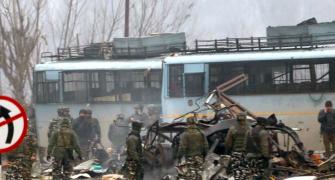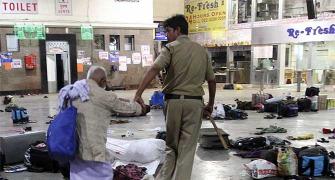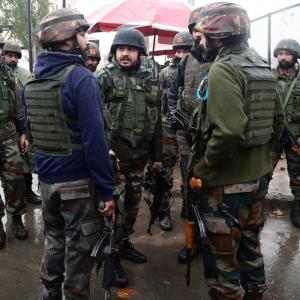Even though the NIA claims that more than 90 per cent of cases charge-sheeted have ended in conviction, the figure is likely misleading.
To date, very few cases investigated by the NIA have resulted in a completed trial, points out former CBI joint director Navneet Rajan Wasan.

The response to terrorist attacks in India, which can have interstate or transnational ramifications, has proven especially difficult for the State Police to manage.
With perpetrators spanning state or national borders, some terror cases have been entrusted to the CBI at the request of the state government.
That bureaucratic delay, however, has impeded many investigations.
For years, security experts, political parties, and even parliamentary committees called for a national-level agency with the ability to investigate terrorism and other threats to internal security without waiting for state-level consent.
For instance, the Second Administrative Reforms Commission, in its reports on public order and combating terrorism, also recommended the creation of a federal agency to investigate terrorism.
After 174 people died in the ghastly 2008 terror attack in Mumbai -- known as 26/11 -- the government fast-tracked a bill in the Lok Sabha to set up the National Investigation Agency, or NIA.
The agency's stated mandate is to investigate and prosecute offences affecting the sovereignty, security, and integrity of India.
The NIA officially came into existence through the NIA Act, passed by Parliament on the last day of 2008.
The Act gives the NIA concurrent and overriding jurisdiction over the state police to probe any offence committed under the Unlawful Activities (Prevention) Act (UAPA), SAARC Convention (Suppression of Terrorism) Act, Chapter VI of the Indian Penal Code (offences against the state, including sedition and waging war against India), possession and circulation of counterfeit currency, and other Scheduled Offences.
In 2018, the Act was amended to include human trafficking, the manufacture or sale of prohibited arms, offences under the Explosive Substances Act, and cyberterrorism.
Significantly, it granted extraterritorial jurisdiction to the NIA, subject to international treaties and domestic laws of the nation(s) concerned.
Under section 3(2) of the Act, the NIA is empowered to investigate offences throughout India and exercise all the powers of the police.
Section 6 of the Act makes the NIA the central government's most capable investigation agency.
Unlike the CBI, the central government does not require the NIA to seek state-level consent before it investigates any offences in its schedule.
This provision has also prompted much controversy, resulting in several court cases over whether the NIA Act violated the Constitutionally enshrined principle of federalism and the distribution of powers.
In one such petition, Sadhvi Pragya Singh Thakur v. State of Maharashtra, the Bombay high court upheld the validity of the Act.

The court based its reasoning on an earlier Supreme Court decision -- PUCL v. Union of India -- which upheld the validity of the 2002 Prevention of Terrorism Act.
Observing that terrorism is a transnational rather than state-specific problem, the court determined that it would not fit within the ambit of 'public order' under the State List, which is confined to disorders of lesser gravity.
In an earlier judgment -- Kartar Singh v. State of Punjab24 -- the court held that activities of a more serious nature, which threaten the security and integrity of the country as a whole, relate to the defence of India and thus fall within the ambit of Entry 1 of the Union List.
Further, the court concluded that Parliament had the legislative competence to enact the NIA Act as it could legislate on any matter not covered under the State List.
The latest challenge to the NIA's legitimacy is a petition filed by the state of Chhattisgarh in the Supreme Court.
It holds that the NIA Act is 'ultra vires the Constitution' and 'beyond the legislative competence of the Parliament'.
The petition states that the Act takes away the state's power to conduct an investigation through its police, while conferring 'unfettered, discretionary and arbitrary powers' on the central government.
It further adds that the provisions of the Act leave no room of coordination and precondition of consent, in any form whatsoever, by the Central government from the State government which clearly repudiates the idea of state sovereignty as envisaged under the Constitution of India.

The challengers have also claimed that the provisions of sections 6(4) and 6(6) of the Act have undermined Entry 2 of List II (State List), which holds that investigation of matters arising within the territorial jurisdiction of any state are generally investigated by State Police.
As widely reported in the media, diplomatic cables exposed by WikiLeaks revealed that in 2011 P Chidambaram, who was home minister at the time, told then US Federal Bureau of Investigations Director Robert Mueller in March 2009 that he was unsure of the NIA's constitutionality.
The Supreme Court's final decision on the validity of the NIA Act remains pending.
***

The NIA, immediately after its formation, was delegated many of the terrorism cases being investigated by the DSPE and State Police, including the Samjhauta Express attacks (2007), the Ajmer Dargah bombing (2007), the Mecca Masjid blast (2007), and the Malegaon bombings (2008).
The investigation and prosecution of these cases, entrusted to the NIA after a long delay, have been subject to much criticism after all the accused in the Samjhauta Express and Mecca Masjid cases were acquitted by the trial court and only two accused were convicted in Ajmer Dargah bombing. The Malegaon case is still pending trial.
Other significant cases entrusted to and investigated by the NIA include the Maoist attack on Sukama district of Chhattisgarh (2013), the Bodh Gaya Temple Complex bombings (2013), the Dilsukhnagar twin blasts (2013), the Burdwan blast case (2014), the Uri attack (2016), the Pathankot Airbase attack (2016), the Jammu and Kashmir terror funding case (2017), and the Pulwama attack that killed more than 40 Central Reserve Police Force personnel (2019).
The Bodh Gaya Temple, Dilsukhnagar, and Burdwan cases have resulted in convictions.
The others are either still under investigation or at trial.
The first-ever case registered under the extra-territorial jurisdiction vested in the NIA was the 2020 attack on a Sikh gurudwara in Kabul, Afghanistan.

The NIA's history of successful investigations and prosecutions has been rather chequered.
Even though it claims that more than 90 per cent of cases charge-sheeted have ended in conviction, the figure is likely misleading.
To date, very few cases investigated by the NIA have resulted in a completed trial.
And in many cases where convictions have been obtained, appeals filed by the convicted are yet to be heard.
A swirling controversy has embroiled the government of the day, which has questionably invoked provisions of the Unlawful Activities Prevention Act in order to entrust cases to the NIA rather than state police.
These actions have even been questioned by the courts.
It is, without doubt, not a healthy practice and may bode poorly for the NIA's enduring credibility.
The unfortunate number of vacancies in various ranks across both the CBI and the NIA presents a serious challenge to the agencies' efficiency and must not be allowed to persist.
The problem of vacancies has also spread over to senior ranks of SPs and DIGs in the past few years.
This author has been an advocate of a system wherein the central government would finance a certain number of inspectors and DySPs in State Police investigation wings, and the states would be obligated to send an equivalent number of officers to the CBI and the NIA.
These officers could revert back to the states after an interval of five or six years, carrying with them valuable investigative experience.
Navneet Rajan Wasan is a retired Indian Police Service officer of the 1980 batch. He has served in senior positions in Andhra Pradesh and at the Centre, including as joint director, Central Bureau of Investigation.
Excerpted from Institutional Roots of India's Security Policy edited by Milan Vaishnav published by OUP with permission.
Feature Presentation: Aslam Hunani/Rediff.com









